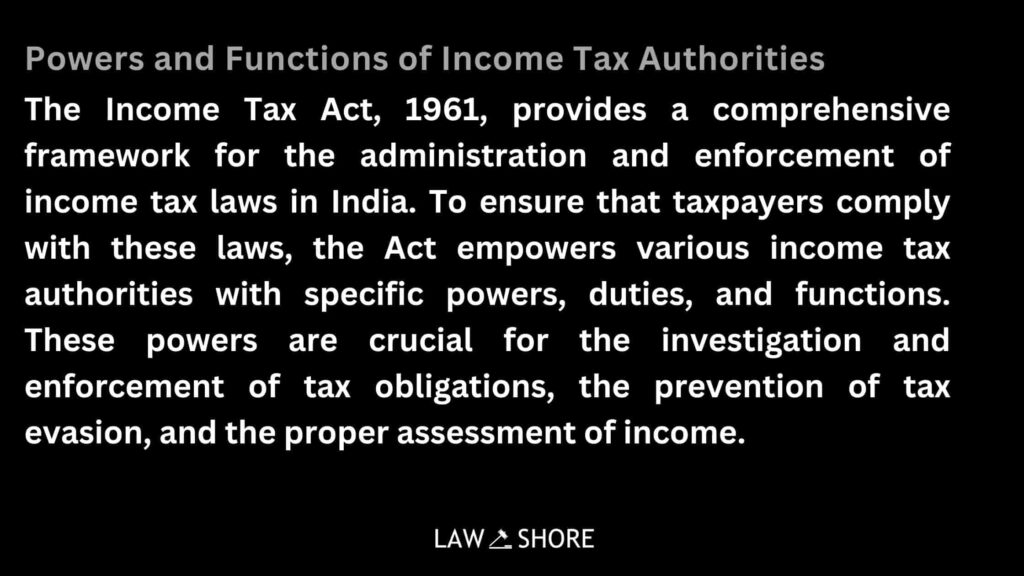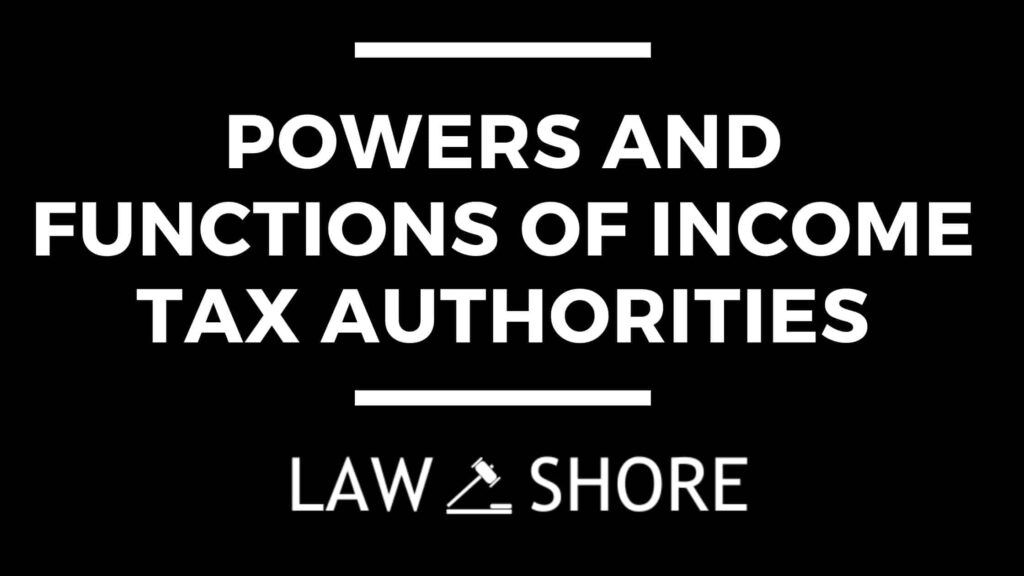Powers and Functions of Income Tax Authorities
Table of Contents
ToggleThe Income Tax Act, 1961, provides a comprehensive framework for the administration and enforcement of income tax laws in India. To ensure that taxpayers comply with these laws, the Act empowers various income tax authorities with specific powers, duties, and functions. These powers and functions of Income Tax Authorities are crucial for the investigation and enforcement of tax obligations, the prevention of tax evasion, and the proper assessment of income.

POWERS OF INCOME TAX AUTHORITIES –
Sections 131 to 136 of the Act specifically address the powers of income tax authorities, providing a range of tools to summon, examine, investigate, and enforce compliance.
Section 131 – Power to Call for Information, Examine Persons, and Enforce Production of Documents
Section 131 of the Income Tax Act grants income tax authorities the power to summon individuals, examine them under oath, and require the production of documents or other evidence. This power is integral to the administration of tax laws and facilitates the collection of necessary information for tax assessments.
The authority to summon and examine persons under oath aligns with the powers exercised by civil courts under the Code of Civil Procedure, 1908 (CPC). This provision is essential for ensuring that taxpayers or third parties provide crucial information that could otherwise be withheld. The ability to compel the production of documents and records ensures that the authorities can access the necessary evidence to determine the true income of an individual or entity. Moreover, in cases of non-compliance, this section also empowers income tax authorities to exercise search and seizure powers, further strengthening their ability to enforce compliance.
This provision serves as a critical tool in combating tax evasion and obtaining information from taxpayers who might be withholding important financial details. It also ensures that false statements or non-cooperation can be penalized.
Section 132 – Power of Search and Seizure
Section 132 provides income tax authorities with the power to conduct searches and seizures when there is a belief that a person is involved in concealing income or evading taxes. This section serves as a significant weapon against the concealment of income or assets that are intended to evade tax obligations.
The authorities can conduct a search on the premises of the taxpayer, business establishments, or other locations where they suspect that concealed income or unaccounted property may be present. During such a search, the authorities have the right to seize documents, records, and other incriminating evidence such as cash that may be linked to undisclosed income.
Section 132’s extensive powers are necessary to unearth hidden wealth and assets that may not otherwise be disclosed during routine assessments. It also empowers authorities to act swiftly and decisively in cases where there is strong evidence of tax evasion or fraud.
Section 133 – Power to Obtain Information from Other Authorities
Section 133 empowers income tax authorities to obtain information from other authorities such as banks, financial institutions, and other third-party entities. This power is instrumental in gathering relevant details that may not be readily available to the taxpayer.
The authorities can call for information on persons, transactions, or assets that are potentially relevant to the income tax assessment process. The section allows for the examination of books of accounts, auditors’ reports, and other financial documents that could shed light on discrepancies or concealment of income. This power broadens the scope of investigations, ensuring that income tax authorities have access to a wide array of data that may reveal hidden income or assets.
This provision highlights the collaborative nature of tax enforcement, as it allows authorities to obtain information from various governmental and private institutions to support their inquiries.
Section 134 – Mode of Proof of Certain Documents
Section 134 addresses the mode of proof of documents submitted before income tax authorities. It is designed to establish the presumption of validity of documents, such as income tax returns, audit reports, and other financial records, unless they are specifically challenged.
This section is crucial for maintaining the integrity of the tax administration process by simplifying the procedures for verifying documents. It ensures that certain documents, when presented in a prescribed manner, are accepted as valid evidence unless the taxpayer or another party contests their authenticity. By streamlining the process of proving the validity of documents, this provision aids in quicker resolution of disputes and assessments.
Section 135 – Delegation of Powers by the Commissioner
Section 135 allows the Commissioner of Income Tax to delegate specific powers to other income tax officials, such as Income Tax Officers, for the performance of their duties. This delegation is essential for the efficient functioning of the income tax department, as it enables the Commissioner to distribute responsibilities and delegate tasks across a wide range of officials.
Delegation of powers ensures that tasks, such as conducting assessments, investigations, and audits, can be performed by officials at various levels. It enhances the capacity of the department to handle a large volume of cases and investigations, thereby promoting efficiency and timeliness in the enforcement of tax laws.
Section 136 – Bar of Jurisdiction of Courts
Section 136 imposes limitations on the jurisdiction of civil courts with respect to income tax matters. The provision ensures that civil courts do not entertain suits, appeals, or proceedings that relate to income tax matters under the Act, except in cases that involve the validity of an order passed by an income tax authority.
This provision is designed to streamline the administration of tax laws by reducing the burden on civil courts and ensuring that tax disputes are resolved through specialized forums, such as the Income Tax Appellate Tribunal (ITAT). The restriction of civil court jurisdiction ensures that income tax authorities can carry out their functions without unnecessary delays or interference, thereby improving the speed and efficiency of tax administration.
However, the section does not preclude judicial intervention in cases where the actions of the authorities violate legal or constitutional principles. This safeguard protects the rights of taxpayers while ensuring that the legal framework for income tax enforcement remains intact.
Powers under Sections 131 to 136
Section | Title | Powers/Functions | Purpose/Objective |
|---|---|---|---|
131 | Power to Call for Information, Examine Persons, etc. | – Power to summon persons for examination under oath. – Ability to require the production of documents or evidence. – Authority to compel testimony and enforce compliance. | – To obtain crucial information related to tax assessments. – To facilitate investigations of concealed income or tax evasion. |
132 | Power of Search and Seizure | – Power to conduct search operations if authorities have reason to believe there is concealed income. – Ability to seize documents, records, and cash related to undisclosed income. | – To uncover concealed assets or income. – To act swiftly against tax evasion or fraudulent activity by seizing relevant evidence. |
133 | Power to Obtain Information | – Power to obtain information from third-party institutions (banks, financial institutions). – Ability to examine books of accounts, audit reports, and related documents. | – To gather external data and evidence that supports income tax assessments. – To conduct thorough investigations for accurate assessments. |
134 | Mode of Proof of Certain Documents | – Presumes the validity of certain documents like income tax returns and audit reports unless contested. – Defines the mode of proof for documents. | – To streamline the process of document validation. – To establish an efficient and reliable method of proof for tax proceedings. |
135 | Delegation of Powers by the Commissioner | – Grants the Commissioner the authority to delegate powers to Income Tax Officers and other officials for efficient tax administration. | – To enhance efficiency and timeliness in the administration of tax assessments and enforcement. – To ensure proper execution of tax-related functions. |
136 | Bar of Jurisdiction of Courts | – Limits the jurisdiction of civil courts over income tax matters. – Civil courts cannot entertain tax matters except those relating to validity of tax orders. | – To expedite tax-related proceedings by reducing court interference. – To ensure that tax disputes are handled by specialized forums like ITAT. |
Functions of Income Tax Authorities and Their Responsibilities
Responsibilities Relating to the Levying and Collection of Direct Taxes
One of the core functions of the Income Tax Department is the levying and collection of direct taxes. Direct taxes, which include Income Tax, Corporate Tax, and Capital Gains Tax, are levied on the income of individuals, businesses, and corporations. The Income Tax Department is tasked with ensuring that taxes are assessed, collected, and deposited in accordance with the law.
Key responsibilities under this function include:
- Tax Assessment: The Income Tax Department assesses the income of taxpayers through various means, including self-assessment, scrutiny, and best judgment assessments.
- Tax Collection: The department ensures the timely collection of taxes from assessees through mechanisms such as TDS (Tax Deducted at Source), advance tax payments, and regular assessments.
- Compliance Monitoring: Ensuring that taxpayers file their returns and make timely payments, and addressing discrepancies between tax returns and actual assessments.
- Audit and Investigation: Conducting audits and investigations to uncover underreporting of income or misrepresentation of tax obligations.
The Income Tax Authorities thus play an indispensable role in maintaining the financial stability of the government by ensuring the efficient collection of taxes from all taxable entities.
Enforcing Double Taxation Avoidance Agreements (DTAA) and Other Economic Laws
India is a signatory to several international treaties and agreements, including Double Taxation Avoidance Agreements (DTAA), which prevent the taxation of the same income by two different countries. The Income Tax Department plays a pivotal role in ensuring the enforcement of these treaties to avoid double taxation and promote international economic relations.
The DTAA ensures that residents of one country who earn income in another country are not taxed twice for the same income. Income Tax Authorities are responsible for:
- Verification and Certification: Ensuring that the taxpayers claiming benefits under the DTAA meet the necessary eligibility criteria and are entitled to exemptions or tax credits.
- Resolving Disputes: Addressing disputes between taxpayers and foreign tax authorities by providing appropriate certifications and representations on behalf of Indian residents.
In addition to enforcing DTAAs, the Income Tax Authorities are responsible for implementing various other significant economic laws, including:
a) Black Money Act of 2015
The Black Money (Undisclosed Foreign Income and Assets) and Imposition of Tax Act, 2015 was introduced to curb the problem of unaccounted income and assets held outside India. The Income Tax Authorities are tasked with:
- Identifying undisclosed foreign assets.
- Prosecuting individuals or entities found guilty of holding black money abroad.
- Collecting taxes on such undisclosed foreign income and assets.
b) Benami Transactions (Prohibition) Act, 1988
The Benami Transactions (Prohibition) Act prohibits the holding of property in someone else’s name to conceal the true ownership of assets. Income Tax Authorities, under this act, are responsible for:
- Investigation of benami transactions and identifying properties held by individuals in the name of others.
- Seizing assets and initiating proceedings for the confiscation of benami properties.
The Income Tax Authorities play a vital role in enforcing these laws, ensuring that foreign assets are properly declared and that illegal transactions are detected and penalized.
Processing Income Tax Rebates
Another significant responsibility of the Income Tax Department is the processing of income tax rebates. Income tax rebates are reductions in tax liability provided to eligible taxpayers based on certain criteria, such as:
- Section 80C: Deductions on investments made in specified financial instruments.
- Section 87A: Rebate for taxpayers with taxable income below a certain threshold.
- Section 89: Relief for taxpayers who receive a salary arrear.
The Income Tax Authorities process the claims for these rebates during the assessment of returns and ensure that the eligibility requirements are met. They also check the authenticity of claims, and if necessary, require further verification or documentation from the taxpayer.
This ensures that taxpayers receive the benefits of rebates they are entitled to, and it also helps in fostering compliance and increasing trust in the tax administration system.
Imposing Fines for Late Filings
The Income Tax Department has the authority to impose penalties and fines for the late filing of income tax returns or non-compliance with tax deadlines. Key functions related to this responsibility include:
- Late Filing Penalties: Under Section 234F, the Income Tax Department can impose penalties for failure to file returns within the prescribed due date. The penalty can range from a fixed amount to an escalating scale depending on how late the return is filed.
- Interest on Late Payments: The department can charge interest on the outstanding taxes owed by the taxpayer for delayed payments.
- Monitoring Compliance: The Income Tax Authorities ensure that the penalties are imposed as per the provisions of the Act, thus ensuring that tax deadlines are respected and tax revenue is not delayed.
This function also acts as a deterrent against delayed filings and encourages taxpayers to comply with filing deadlines, thus maintaining the efficient functioning of the tax system.
Prosecuting Assesses in Case of Tax Evasion
In cases of tax evasion, the Income Tax Authorities have the power to prosecute the assesses involved in wilfully concealing income or underreporting tax liabilities. Tax evasion is a serious offense under Indian tax law, and the authorities are tasked with taking strict action against offenders.
Key prosecutorial functions include:
- Investigations and Evidence Collection: The Income Tax Department investigates cases of tax evasion, collects evidence, and conducts raids if necessary.
- Filing Prosecution Cases: If sufficient evidence is found, the department may file prosecution cases in courts, resulting in penalties, fines, and even imprisonment.
- Appeals: The Income Tax Department is responsible for representing the government’s case in tax tribunals and higher courts if an appeal is filed by the assessees.
The prosecution process ensures that individuals and entities who evade taxes are penalized, thereby upholding the integrity of the tax system and discouraging non-compliance.
Preventing and Detecting Money Laundering
The Income Tax Department is an integral part of India’s anti-money laundering (AML) efforts, particularly in collaboration with agencies such as the Financial Intelligence Unit (FIU) and the Enforcement Directorate. The department is tasked with:
- Monitoring Suspicious Transactions: Identifying transactions that appear suspicious or are inconsistent with a taxpayer’s known income and financial profile.
- Reporting to Authorities: Referring such transactions to appropriate law enforcement agencies for further investigation.
- Compliance with AML Regulations: Ensuring that financial institutions and businesses comply with Know Your Customer (KYC) norms and report suspicious activities.
By taking a proactive role in detecting and reporting money laundering activities, the Income Tax Department helps reduce the risk of financial crimes and maintain the integrity of the financial system.
Promoting Awareness and Education
The Income Tax Department also undertakes various efforts to promote awareness and educate taxpayers about their obligations under the Income Tax Act. Key activities in this area include:
- Public Campaigns and Outreach: The department organizes awareness campaigns to inform taxpayers about changes in tax laws, deadlines for filing returns, and the importance of timely compliance.
- Taxpayer Assistance: Providing guidance and support to taxpayers through helplines, online services, and tax clinics.
- E-filing and Digitalization: Encouraging taxpayers to file their returns electronically, which ensures transparency, reduces paperwork, and streamlines the entire process.
Handling Appeals and Disputes
The Income Tax Department is responsible for handling disputes between taxpayers and the tax authorities. When taxpayers disagree with the assessments or penalties imposed by the authorities, they have the right to file appeals.
- First Appeal (Commissioner of Income Tax): The taxpayer can file an appeal with the Commissioner of Income Tax (Appeals) for redressal.
- Second Appeal (Income Tax Appellate Tribunal): If the dispute is not resolved at the first appeal level, the case can be further escalated to the Income Tax Appellate Tribunal (ITAT).
- Higher Judicial Authorities: In some cases, further appeals may be made to the High Court or Supreme Court, especially in matters of significant legal interpretation.
The Income Tax Authorities are responsible for defending the government’s position in these appellate forums, ensuring that the laws are enforced consistently and fairly.
Conclusion
The powers outlined in Sections 131 to 136 of the Income Tax Act, 1961, form the cornerstone of the enforcement mechanism of India’s tax regime. They equip income tax authorities with the tools needed to summon, examine, investigate, and ensure compliance with the provisions of the Act. These sections help to uncover concealed income, combat tax evasion, and maintain the integrity of the tax system.
While the powers granted to income tax authorities under these sections are extensive, they are balanced by provisions that ensure fairness and accountability, such as the ability of taxpayers to challenge the validity of documents (Section 134) and the jurisdictional limitations of civil courts (Section 136). Together, these provisions strike a balance between effective tax enforcement and protection of individual rights, ensuring a robust framework for both taxpayers and the authorities involved in the income tax process.
By maintaining a firm and consistent enforcement approach, these sections play a pivotal role in ensuring compliance, enhancing transparency, and contributing to the overall growth of the nation’s economy.
Explore Law Shore: law notes today and take the first step toward mastering the fundamentals of law with ease.

After Completing my LLB hons, I started writing content about legal concepts and case laws while practicing. I finally started Law Shore in 2024 with an aim to help other students and lawyers.



